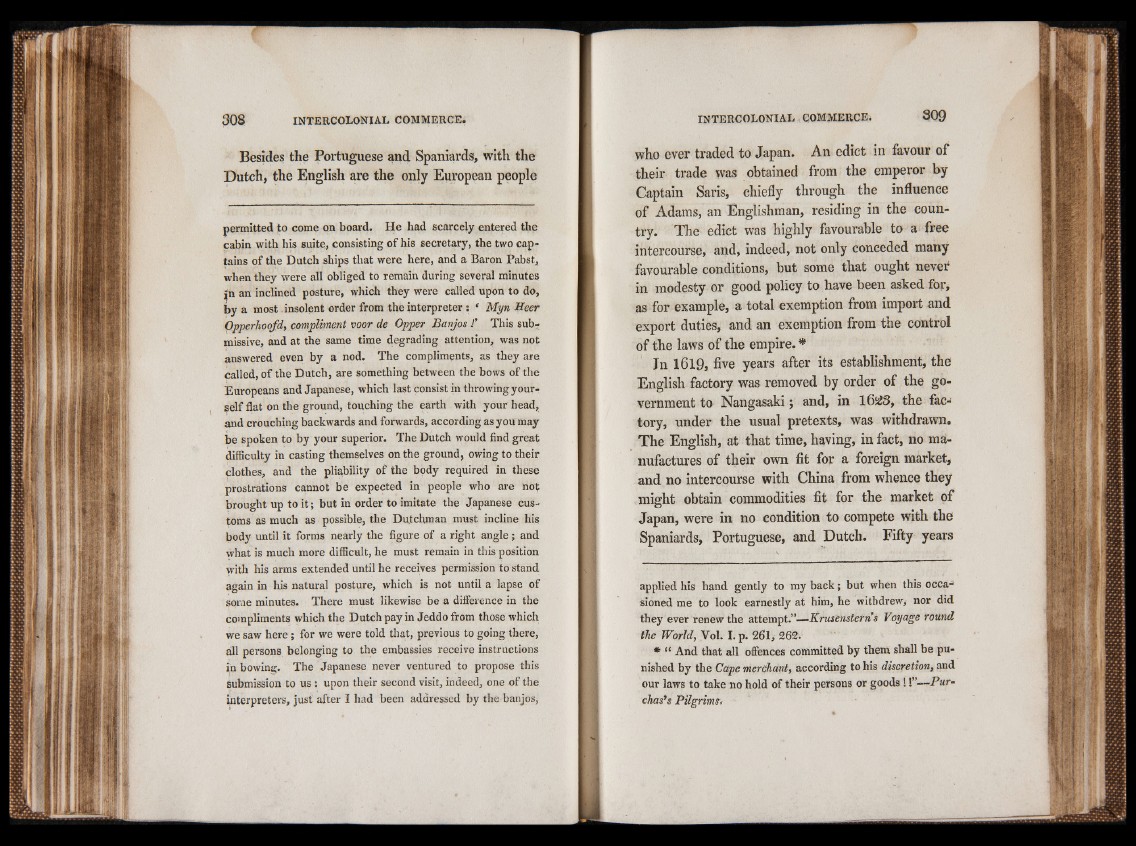
Besides the Portuguese and Spaniards, with the
Dutch, the English are the only European people
permitted to come on board. He had scarcely entered the
cabin with his suite, consisting of his secretary, the two captains
of the Dutch ships that were here, and a Baron Pabst,
when they were all obliged to remain during several minutes
in an inclined posture, which they were called upon to do,
by a most .insolent order from the interpreter : ‘ Myn Heer
Qpperhoofd, compliment voor de Opper Banjos !' This submissive,
and at the same time degrading attention, was not
answered even by a nod. The compliments, as they are
called, of the Dutch, are something between the bows of the
Europeans and Japanese, which last consist in throwing yourself
flat on the ground, touching the earth with your head,
and crouching backwards and forwards, according as you may
be spoken to by your superior. The Dutch would find great
difficulty in casting themselves on the ground, owing to their
clothes, and the pliability of the body required in these
prostrations cannot be expected in people who are not
brought up to it; but in order to imitate the Japanese customs
as much as possible, the Dutchman must incline his
body until it forms nearly the figure of a right angle ; and
what is much more difficult, he must remain in this position
with his arms extended until he receives permission to stand
again in his natural posture, which is not until a lapse of
sorae minutes. There must likewise be a difference in the
compliments which the Dutch pay in Jeddo from those which
we saw here; for we were told that, previous to going there,
all persons belonging to the embassies receive instructions
in bowing. The Japanese never ventured to propose this
submission to us: upon their second visit, indeed, one of the
interpreters, just after I had been addressed by the banjos,
who ever traded to Japan. An edict in favour of
their trade was obtained from the emperor by
Captain Saris, chiefly through the influence
of Adams, an Englishman, residing in the country.
The edict was highly favourable to a free
intercourse, and, indeed, not only conceded many
favourable conditions, but some that ought never
in modesty or good policy to have been asked for,
as for example, a total exemption from import and
export duties, and an exemption from the control
of the laws of the empire. *
Jn 1619, five years after its establishment, the
English factory was removed by order of the government
to Nangasaki; and, in 16:23, the factory,
under the usual pretexts, was withdrawn.
The English, at that time, having, in fact, no manufactures
of their own fit for a foreign market,
and no intercourse with China from whence they
might obtain commodities fit for the market of
Japan, were in no condition to compete with the
Spaniards, Portuguese, and Dutch. Fifty years
applied his hand gently to my back; but when this occasioned
me to look earnestly at him, he withdrew, nor did
they ever renew the attempt.”—Krusenstern s Voyage round
the World, Vol. I. p. 261, 262.
* “ And that all offences committed by them shall be punished
by the Cape merchant, according to his discretion, and
our laws to take no hold of their persons or goods 11”—Purchases
Pilgrims,